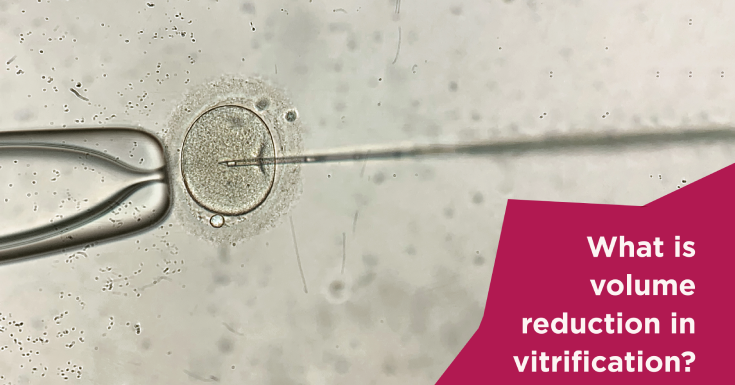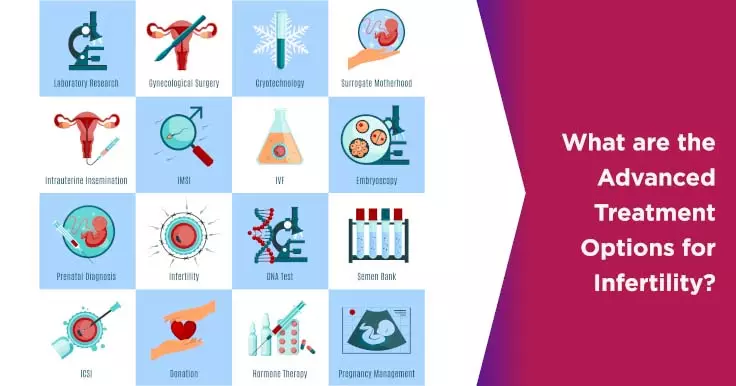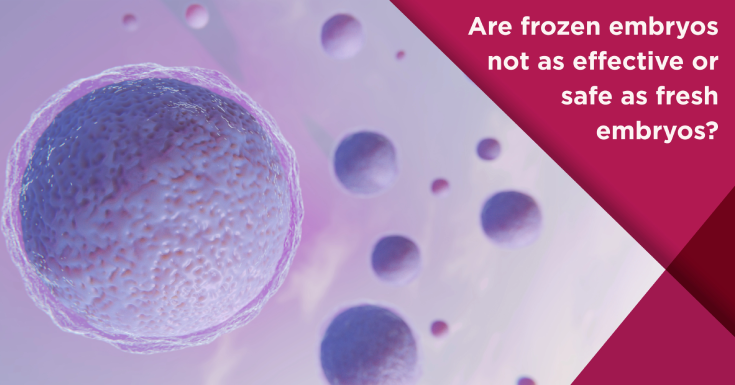In-vitro fertilisation has been a hope for numerous individuals and couples struggling to conceive naturally or those who are planning to delay their parenthood. Cryopreservation is one such advanced technology that has been used to freeze eggs, sperm, and/or embryos for later use or for IVF cycles. There are mainly two types of freezing methods used: slow freezing and vitrification.
For years, slow freezing served as the recommended method for preserving eggs and embryos. Slow freezing gradually cools embryos until they reach -30 °C and are totally frozen. The frozen cells are preserved in liquid nitrogen at -196 °C.
However, in recent years, a superior technology, vitrification, has evolved for freezing eggs and embryos. It involves the rapid cooling of embryos and eggs to extremely low temperatures, giving them a glass-like state. This quick-freezing procedure dramatically minimises the chance of ice crystal formation, increasing egg and embryo survival rates as opposed to slow freezing.
This page discusses the vitrification meaning, process, and benefits in IVF, and more.
Book your Appointment

What is the Vitrification meaning in IVF?
The term 'vitrification' is derived from the Latin phrase for glass, vitrum. In fertility and IVF, vitrification refers to the process of rapid freezing so that the molecules of water do not have time for the formation of ice crystals and instead solidify instantly into a glass-like structure. This technique is a far more complex procedure than prior 'slow freezing' procedures, and it has produced satisfactory results. Over the years, the success rates of pregnancy through vitrification have become equivalent to fresh IVF cycles, a remarkable accomplishment.
To better understand the differences between vitrification and slow freezing, consider when you are getting food out of your home freezer. Have you sometimes noticed crystals of ice on your food? This is similar to what scientists used to see inside slow-frozen cells in the laboratory when ice crystal formation would fragment and fracture, thereby destroying many of the slow-frozen specimens.
Conversely, vitrification uses an exceptionally rapid rate of freezing (about 15,000 °C/min) to achieve near-instantaneous freezing. Additionally, vitrification preserves the crystalline lattice structure, which prevents ice crystal formation. Multiple studies have found that any vitrification procedure causes minimal damage. Furthermore, vitrification technology enables specimens to be kept indefinitely with no or little detrimental impact on sample storage duration. Vitrification brought about exceptional results.
In What Situations is Vitrification Process Suitable?
- Women who, for various reasons, want to delay childbirth.
- Cancer patients, as well as others who will be receiving gonadotoxic therapies.
- Women who have undergone repeated ovarian surgeries, such as endometriosis.
- Individuals for whom it is preferred to do embryo transfer in a cycle besides the one in which follicular stimulation occurs, due to the risks of ovarian hyperstimulation syndrome (OHSS), the formation of polyps, hydrometra, or hydrosalpinx, or insufficient spermatozoa.
- Patients who do not respond well to ovarian stimulation or achieve a sufficient number of oocytes, especially if the goal is to perform a cycle of pre-implantation genetic testing.
The Process of Vitrification: Step-by-Step
The egg and/or embryo vitrification process consists of three important components:
- First, eggs and/or embryos are subjected to cryoprotectants at high concentrations, which allow for rapid cell dehydration.
- Then, the eggs or/and embryos are put into small storage devices (generally straws) that will allow for ultra-rapid cooling, allowing for proper protection and storage during the freezing process.
- Third, the straws containing the sperm, eggs, or/and embryos are frozen as quickly as possible, often at several thousand degrees per minute. This fast-freezing rate, along with the cryoprotectants, allows the straw's contents to vitrify, resulting in a glass-like structure instead of ice, preventing the formation of ice and efficiently shielding cells from damage.
This vitrification process generally results in survival rates above 90% because it retains the embryos and/or eggs, allowing them to be successfully warmed and used later.
Reversing the Vitrification Cryopreservation Process
Whenever individuals want to use their vitrified eggs and/or embryos, the above-mentioned vitrification method is reversed to allow for warming to room temperature, subsequently 37°C, and rehydration. The process warms the eggs/embryos in about 20 minutes, and then they are placed in the incubator at 37°C in the laboratory.
Embryos can be transported to the uterus right away, and an egg can be injected using a single sperm (a process called intracytoplasmic sperm injection (ICSI)) three to four hours later.
Applications of Vitrification in IVF
Assisted hatching
The cryoprotectants involved in the procedure of vitrification can harden the zona pellucida, which is a glycoprotein shell that covers the egg and embryo. Since the embryo will need to hatch out of the zona pellucida after being warmed and implanted into the uterus, a hole is cut in it before transferring the embryo. This hole is created using a precise laser, which simply makes it possible to overcome the hardening of the zona that is characteristic of the vitrification procedure. Cutting a little escape hole in the zona causes no injury because it is a non-living portion of the embryo.
Intracytoplasmic sperm injection (ICSI)
ICSI is a method that involves injecting one sperm directly into an egg. Normally, this procedure is reserved for patients with poor quality of sperm or when it is anticipated that sperm will be unable to fertilise eggs on its own. However, due to the zona pellucida becoming more rigid during vitrification, fertilisation of all vitrified eggs is performed using the ICSI technique. The modifications in the zona restrict sperm from penetrating normally; therefore, each egg must be injected separately with a single sperm.
Benefits of Vitrification
Following are some of the benefits of vitrification cryopreservation:
- Vitrification has greatly improved embryo and egg rates of survival (maintenance of survival), resulting in significantly more effective embryo transfer or IVF treatment.
- Vitrification has greatly enhanced the overall successful pregnancy rates and the safety of assisted reproduction.
- Vitrification directly contributes to the widespread use of elective single embryo transfer, resulting in a significant decrease in the incidence of pregnancies associated with the IVF treatment.
- Patients having additional embryos from an IVF cycle can freeze them in order to be used to conceive later.
- If a fresh embryo transfer is unsuccessful, a frozen embryo is readily available, so there is no need for a full IVF cycle.
- Frozen embryos do not become compromised with age. If you freeze an embryo at the age of 30 years and use it at 35 years of age, the cell quality and structure stay intact.
Challenges and Limitations – Risks & Potential Long-Term Effects of Vitrification Process
Even while vitrification is a more trustworthy freezing procedure than slow freezing, with significantly higher rates of survival, keep in mind that:
- Not each frozen embryo or egg may survive the warming process. Not every frozen egg will fertilise, and not every embryo will develop further.
- Just as fresh embryos and eggs do not always develop as anticipated, frozen embryos and eggs have the same natural boundaries.
- There has been little concern regarding the amount of cryoprotectants used for vitrification and their possible effect on frozen cells. Researchers are constantly looking for ways to reduce the risks associated with cryoprotectant toxicity.
However, frozen embryos have the advantage of being able to screen for specific genetic variations and chromosomal defects, such as trisomy 21, a condition which causes Down's syndrome, among others. Being able to de-select defective embryos offers an opportunity to increase the number of live births even further.
Summary
Cryotech vitrification has revolutionised IVF by providing a highly effective way to freeze and preserve eggs and embryos. This rapid freezing approach produces better results than standard slow freezing techniques, with higher rates of survival and successful pregnancy rates. Therefore, vitrification is an important technique in fertility preservation and assisted reproductive technology.
If you are having fertility problems or thinking about freezing your eggs or/and embryos for later use, vitrification offers a reliable and modern method to help you reach your reproductive goals.
FAQ on Clinic detail Page
Frequently Asked Questions
IVF was initially developed for women who had obstructed or missing fallopian tubes, and it remains the preferred method in these cases. It is also utilised when other conditions exist, such as male factor infertility, endometriosis, and unexplained infertility, where no underlying cause of infertility can be identified. Our professionals will analyse your medical history and direct you to the most appropriate therapy and diagnostic tests for you.
Yes, definitely, vitrification of eggs and embryos has proven to be beneficial because it increases the survival rates of eggs and embryos and improves overall pregnancy rates through IVF.
Yes, several successful pregnancies have been achieved using vitrified embryos or eggs. The rate of success is comparable to those obtained with fresh eggs or embryos.
Women are born with roughly two million eggs within their ovaries. Every month, approximately 11,000 eggs die prior to a girl's adolescence. Thus, during her adolescence, a woman has only roughly 300,000 to 400,000 eggs left. From this point forward, around 1000 eggs are used each month. This is unrelated to any method of pregnancy, hormone production, birth control, lifestyle, health, or nutritional supplements. Menopause occurs when a woman no longer has viable eggs.
 Infertility Counselling
Infertility Counselling Female Infertility Treatment
Female Infertility Treatment Andrology Treatment
Andrology Treatment Fertility Enhancing Surgeries - Female
Fertility Enhancing Surgeries - Female Fertility Enhancing Surgeries - Male
Fertility Enhancing Surgeries - Male Endoscopy Treatment
Endoscopy Treatment IUI Treatment
IUI Treatment IVF Treatment
IVF Treatment ICSI Treatment
ICSI Treatment Advanced IVF Solutions
Advanced IVF Solutions Embryology
Embryology Vitrification Egg, Embryo, Sperm Freezing
Vitrification Egg, Embryo, Sperm Freezing Preimplantation Genetic Testing (PGT)
Preimplantation Genetic Testing (PGT) Donation Program Embryo / Egg / Sperm
Donation Program Embryo / Egg / Sperm Self-cycleTM IVF
Self-cycleTM IVF

 Self-cycleTM IVF
Self-cycleTM IVF








